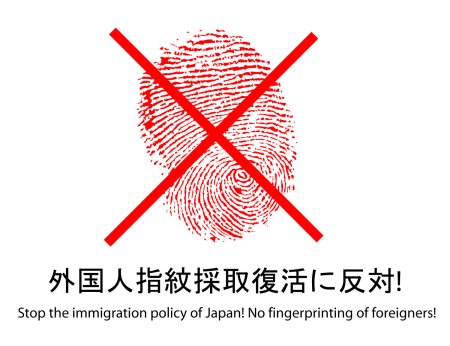Despite protests from human rights organizations and the foreign community, new immigration procedures [1], which require all non-Japanese citizens over 16 years of age to be fingerprinted and photographed when entering Japan, will come into effect on November 20, 2007. Fingerprinting of foreign nationals in Japan is not a new affair, however. Japan used to fingerprint foreign residents [2] until, following protests mainly organized by “special permanent residents” of Korean [3] and Chinese [4] descent, the system was abolished in 1999. But this time, it came back under the name of the war on terror.
 [5]
[5]
Illustration: Flickr user stbeck [6] CC-BY-NC-SA [7]
To many Japanese, the introduction of the new system, let alone the passing of the bill, is still unknown. futureeye [8] points out to the fact that the new system has been put in place without most Japanese even knowing.
今回の一番の問題は、住基ネットのときのような、賛否両論に分かれた議論がなんらなされていないことです。この法案がいつ通ったのかさえ、国民の大部分が知りません。日本政府の言い分としては、「外国人に対しての指紋照合制度であり日本人は無関係の法案のため、住基ネットのときのような議論は不要である」程度の反論が考えられます。しかし、前述したように、相互主義は世界政治の常識です。後々日本人に付けが回ってきます。このような法案を、我々が知らないうちにこっそりと通していいのでしょうか?
Blogger Danny Choo [9] writes:
I'm not exactly sure how fingerprinting somebody is going to stop evil intentions. If a person wants to blow him/herself up then a fingerprint is not exactly going to stop them from doing so.
I can see how it can play a part in preventing overstay – photos of overstayers can be published as soon as their permitted stay has exceeded for example.
As Japanese blogger oheohehe [10] puts it:
時代の状況を考えれば当然の事です。
やましい事を考えている人間だけが文句を言うだけだ。
例えば朝鮮人や〜社民党の方々、弁護士の一部・・・・・
Only those people who have an evil conscience complain about this.
For example, North Koreans and members of the Social Democratic Party, and some lawyers…
This blogger gives his version of explanation [11] as to why foreigners should be fingerprinted.
指紋押捺制度はこう説明すべきなのだ。
外国人には日本人と違って戸籍がない。
だから日本人と異なる取り扱いをしても,不当な差別にあたらない。戸籍がないため,入国している外国人は一定の管理の必要があるといえる。
また外国人犯罪も凶悪化している。入管行政の実効性も確保しなければならない。ただ写真照合では同一人かどうかの判断は極めて困難。
個人を特定する上で「指紋の押捺」が最も確実といえる。ゆえに指紋押捺制度は必要。
Unlike Japanese citizens, foreigners do not have koseki [12].
Therefore, treating foreigners in a different way is not unfair discrimination.
Because foreigners do not have koseki [12], there is a certain necessity for foreigners who have entered Japan to be kept track of.
Also, the intensity of crimes committed by foreigners is increasing.
Just matching photos is not enough to verify that it's the same person.
Fingerprinting is the most efficient way of identifying an individual.
Therefore the fingerprinting system is necessary.
On the other hand, there are many bloggers who express their criticism of fingerprinting. Blogger Odoru OL [13] writes:
海外旅行で入国審査時に顔写真や指紋を取得されるのは、犯罪者の予備軍と見られているようで、あまり気分は良くありません。
まして、審査官はともかく、入国審査窓口に並んで待っている外国人を誘導する警備員のような人たちの態度は、往々にして悪いことが多いです。なので、テロ対策という名目は分かっていても、完全にテロを防止できるわけではないのに、なぜ善良な市民がそのしわ寄せを受けるのか、といった文句も、長い行列にうんざりしているときには、頷いてしまったりします。
(時間がかかりすぎて搭乗時刻に間に合わなくなると、一転してスルーパスになることも疑問です。)
On top of that, leaving aside the immigration officers, people who look like security guards and guide foreigners lining up at immigration counters very often have bad attitudes.
So, even though I understand that it is a part of the anti-terror measures, when I get sick and tired of being in a long line, I have to agree with those who complain: why do good citizens have to deal with this even though you can never completely prevent terrorism? (The fact that you are allowed to pass through [immigration] in cases where you are close to your boarding time and [being checked] would take too much time also raises questions.)

Animation by Nick Wood, posted at debito.org [14]
Tako [15] expresses his disappointment and criticizes the Japanese government for focusing on the wrong target.
この11月から、日本へ入国する外国人は入国審査で「指紋採取」および「顔写真撮影」されることとなるんですって(例外あり)。これは米国に続いて二国目です。
いつだったっか、日本在住の外国人に対し、外国人登録時に指紋を取らなりましたよね。頭から外国人を犯罪者扱いしなくなったから「日本もまともに近づいたね」と思っていたのに、ああ残念。
今回導入される入国審査規定の紹介ビデオが政府のホームページで見られるので、興味のある人は是非見てください。
テロ対策という大義名分ですが、うさんくさいなあ。
近年のテロって、同国籍の人物によるものばかりじゃあないですか(イギリスで起きたテロは少なくともイギリス国籍の人物だった)。それに日本で起きたテロらしいテロと言えば地下鉄サリン事件などで、結局日本人の仕業だったし。訪問者を疑うよりも国内の怪しい組織の動きにもっとアンテナを張ってもらいたいものです。
Some time ago, they stopped fingerprinting foreigners in Japan. I was thinking [at the time]: “Japan has stepped closer to becoming a decent country”, since Japan had stopped automatically treating foreigners as if they were criminals. Oh am I disappointed.
You can watch a video explaining the immigration examination policy [16], so check it out if you're interested.
They say they are doing it in the name of anti-terror measures, but it sounds sketchy.
Many recent cases of terrorism were carried out by individuals who held citizenship of the country (the terror incident in England at least was done by British nationals). And speaking of cases in Japan that you could all terrorism, we have for example the Sarin gas attack on the Tokyo subway [17], and that after all was done by Japanese nationals.
Rather than suspecting visitors, I wish they would instead keep an eye on the actions of suspicious organizations in Japan.
For comprehensive background and up-to-date information in English, see the fingerprinting NJ archive [14] at debito.org.